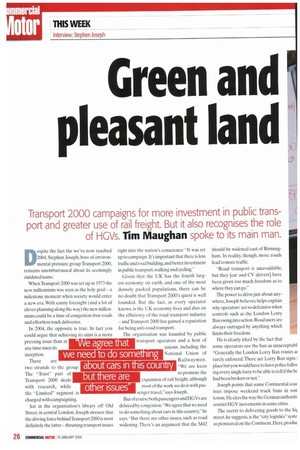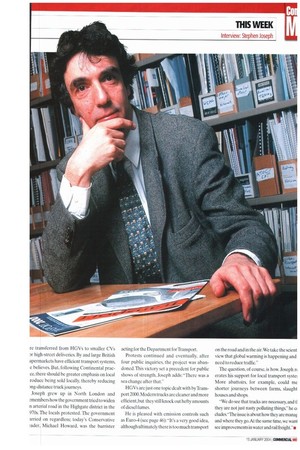Transport 2000 campaigns for more investment in public trans
Page 28

Page 29

If you've noticed an error in this article please click here to report it so we can fix it.
port and greater use of rail freight. But it also recognises the role of HGVs. Tim Maughan spoke to its main man.
Despite the fact the we've now reached 2004, Stephen Joseph, boss of environmental pressure group Transport 2000, remains unembarrassed about its seemingly outdated name.
When Transport 2000 was set up in 1973 the new millennium was seen as the holy grail a milestone moment when society would enter a new era. With canny foresight (and a lot of clever planning along the way) the new millennium could be a time of congestion-free roads and effortless truck deliveries.
In 2004, the opposite is true. In fact you could argue that achieving its aims is a more pressing issue than at any time since its inception.
There are two strands to the group. The "Trust" part of Transport 2000 deals with research, while the "Limited" segment is charged with campaigning.
Sat in the organisation's library off Old Street. in central London. Joseph stresses that the driving force behind Transport 2000 is most definitely the latter thrusting transport issues right into the nation's conscience: "It was set up to campaign. It's important that there is less traffic and road building, and better investment in public transport, walking and cycling."
Given that the UK has the fourth largest economy on earth, and one of the most densely packed populations, there can be no doubt that Transport 2000's quest is well founded. But the fact, as every operator knows, is the UK economy lives and dies on the efficiency of the road transport industry and Transport 2000 has gained a reputation for being anti-road transport.
The organisation was founded by public transport operators and a host of unions, including the National Union of Railwaymen. "We are keen to promote the expansion of rail freight, although most of the work we do is with passenger travel," says Joseph.
But of course both passengers and HGVs are delayed by congestion." We agree that we need to do something about cars in this country," he says. "But there are other issues, such as road widening. There's an argument that the M42 should be widened east of Birmingham. In reality. though, more roads lead to more traffic.
"Road transport is unavoidable, but they [car and CV drivers] have been given too much freedom as to where they can go."
The power to drive just about anywhere. Joseph believes, helps explain why operators' are so defensive when controls such as the London Lorry Ban swing into action. Road users are always outraged by anything which limits their freedom.
He is clearly irked by the fact that some operators see the ban as unacceptabl -Generally the London Lorry Ban routes ai rarely enforced. There are Lorry Ban signs i place but you would have to have police folios ing every single lorry to be able to tell if the bE had been broken or not."
Joseph points that some Continental cot]] tries impose weekend truck bans in son towns. He cites the way the German authotiti, restrict HGV movements in some cities.
The secret to delivering goods to the 114 street, he suggests. is the "city logistics" syste as pioneered on the Continent. Here, produc re transferred from HGVs to smaller CVs 31. high-street deliveries. By and large British upermarkets have efficient transport systems, e believes. But, following Continental pracce, there should be greater emphasis on local roduce being sold locally, thereby reducing mg-distance truck journeys.
Joseph grew up in North London and :members how the government tried to widen n arterial road in the Highgate district in the 970s. The locals protested. The government arried on regardless; today's Conservative :ader, Michael Howard, was the barrister acting for the Department for Transport.
Protests continued and eventually, after four public inquiries, the project was abandoned.'This victory set a precedent for public shows of strength. Joseph adds: "There was a sea change after that."
HGVs are just one topic dealt with by Transport 2000. Modern trucks are cleaner and more efficient,but they still knock out hefty amounts of diesel fumes.
He is pleased with emission controls such as Euro-4 (see page 46): "It's a very good idea, although ultimately there is too much transport on the road and in the air. We take the scient view that global warming is happening and need to reduce traffic."
The question. of course, is how. Joseph n erates his support for local transport systei More abattoirs. for example, could me shorter journeys between farms, slaught houses and shops.
-We do see that trucks are necessary, and ti they are not just nasty polluting things," he a cludes."The issue is about how they are manag and where they go. At the same time. we wani see improvements in water and rail freight.".
































































































































































































